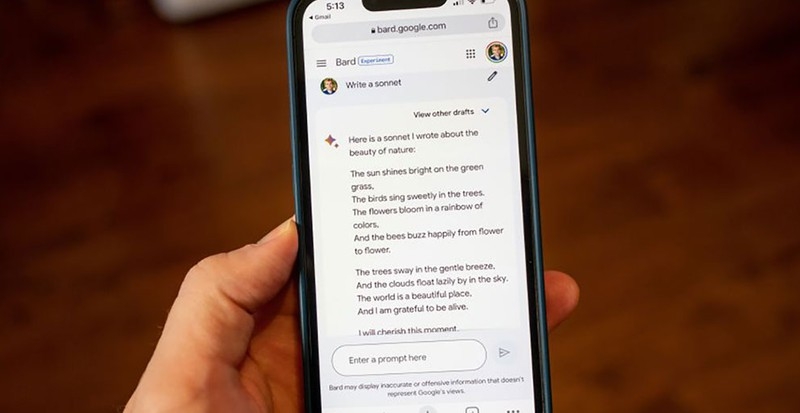Google Bard is a chatbot that competes with OpenAI’s ChatGPT, offering similar functions, appearance, and training processes. Google Bard has a significant advantage over ChatGPT in its understanding of up-to-date information. However, ChatGPT has a stronger understanding of logic, writing style, and complex problems. Google Bard is still in its infancy and can easily become confused with simple prompts. It struggles to create jokes or comedy sketches, resulting in nonsensical answers that are neither funny nor make sense. Despite its focus on neutrality and safety, Google Bard occasionally slips up and produces inappropriate responses. As the chatbot continues to learn and develop, it may become more adept at creating appropriate and humorous responses.
Google Bard: A Competitor to ChatGPT in the Ultimate AI Chatbot Race
Google has entered the AI chatbot arena with its latest offering called Google Bard, competing directly with OpenAI’s ChatGPT. With similar functions, appearance, and training process, Google Bard offers users a comparable experience to ChatGPT. However, the question remains, what sets Google Bard apart, and how does it work?
What is Google Bard and How to Use It?
Google Bard is the newest chatbot available to users, and it is accessible through a waitlist that users can sign up for. Currently, the software is free to use once users gain access. Like ChatGPT, Google Bard works by presenting users with a text box where they can type a worded command, and the bot will respond with its answer. The chatbot’s abilities range from writing poems to suggesting book titles, translating poems, solving mathematical problems, and more. Though it can get confused or unable to complete some requests, it can handle most requests users throw at it.
How does Google Bard Work?
According to Google, the training process for Google Bard involves four steps. First, data from various sources, including Wikipedia, GitHub, public data sets, third-party companies, and internal data from Google, is collected and prepared for the training process. This data is then fed into a neural network that learns to generate text, translate languages, and write creative content in response to user requests.
After the model is trained, it undergoes a testing phase where its output is compared to human-generated text, translations, and creative content. This process helps identify areas where the model needs improvement, and based on the results, the model can be refined by adding more data to the training set, changing the model’s architecture, or using different training algorithms.
In summary, Google Bard is a competitor to ChatGPT, offering users a similar chatbot experience with a few distinct features. Google Bard’s training process involves collecting and cleaning data from various sources, feeding the data into a neural network, testing the model’s output, and refining it based on the results. As artificial intelligence continues to evolve, we can expect more companies to enter the chatbot race, pushing the boundaries of what chatbots can do.
Google Bard: How it Compares to ChatGPT
Google Bard is a chatbot that competes with OpenAI’s ChatGPT, offering similar functions, appearance, and training processes. While they have many similarities, there are some differences between the two.
Google Bard’s Benefits
Google Bard has a significant advantage over ChatGPT in its understanding of up-to-date information. For example, it can tell you who the current UK prime minister is, which ChatGPT cannot. It can also summarize a list of pros and cons of restaurants, recommend places to live based on house prices in 2023, and list the dates of UK festivals this year. In general, it seems to have a stronger understanding of regional topics and recent issues.
ChatGPT’s Strengths
In contrast, ChatGPT has a stronger understanding of logic, writing style, and complex problems. While Google Bard struggles with math and logic problems, ChatGPT can handle them with ease. Additionally, ChatGPT has been trained on a broader range of data and has a better understanding of writing styles.
Google Bard’s Infancy
While Google Bard is impressive in its understanding of recent events and niche information, it is still in its infancy. During testing, the chatbot could easily become confused. It struggled with simple prompts and could make mistakes when asked to perform tasks such as solving math problems or writing a poem without a particular letter.
Conclusion
In summary, Google Bard and ChatGPT are both highly capable chatbots, each with its own strengths and weaknesses. Google Bard has a better understanding of recent events and regional topics, while ChatGPT has a stronger grasp of logic and writing style. As Google Bard is in its infancy, there is room for improvement and refinement as the team continues to learn from user interactions. Ultimately, the choice between the two chatbots depends on the user’s specific needs and preferences.
Google Bard: The Serious Chatbot Competitor
Google Bard is a serious competitor to OpenAI’s ChatGPT. While ChatGPT has been known to crack jokes and impersonate celebrities, Bard takes a more level-headed approach to conversations. It avoids controversial topics such as politics, gender, and economics and keeps things neutral and safe.
The Lack of Personality
Whether intentional or not, Google Bard is not the most personable chatbot out there. It takes a serious approach to prompts, even those related to comedy. When asked to write stand-up comedy routines or sketches, Bard responds with a straightforward answer. It also struggles to create jokes or comedy sketches, resulting in nonsensical answers that are neither funny nor make sense.
The Dark Side
Despite its focus on neutrality and safety, Google Bard occasionally slips up and pulls out an unexpected dark side. While it has restrictions on hateful, violent, or discriminatory topics, some inappropriate jokes can slip through. As more people use the chatbot, it will develop a better understanding of what is appropriate and safe to say.
Conclusion
In summary, Google Bard is a serious chatbot competitor to ChatGPT. While it lacks the personality and humor of ChatGPT, Bard takes a level-headed approach to conversations and avoids controversial topics. However, it occasionally slips up and can produce inappropriate responses. As the chatbot continues to learn and develop, it may become more adept at creating appropriate and humorous responses.
Don’t miss interesting posts on Famousbio









